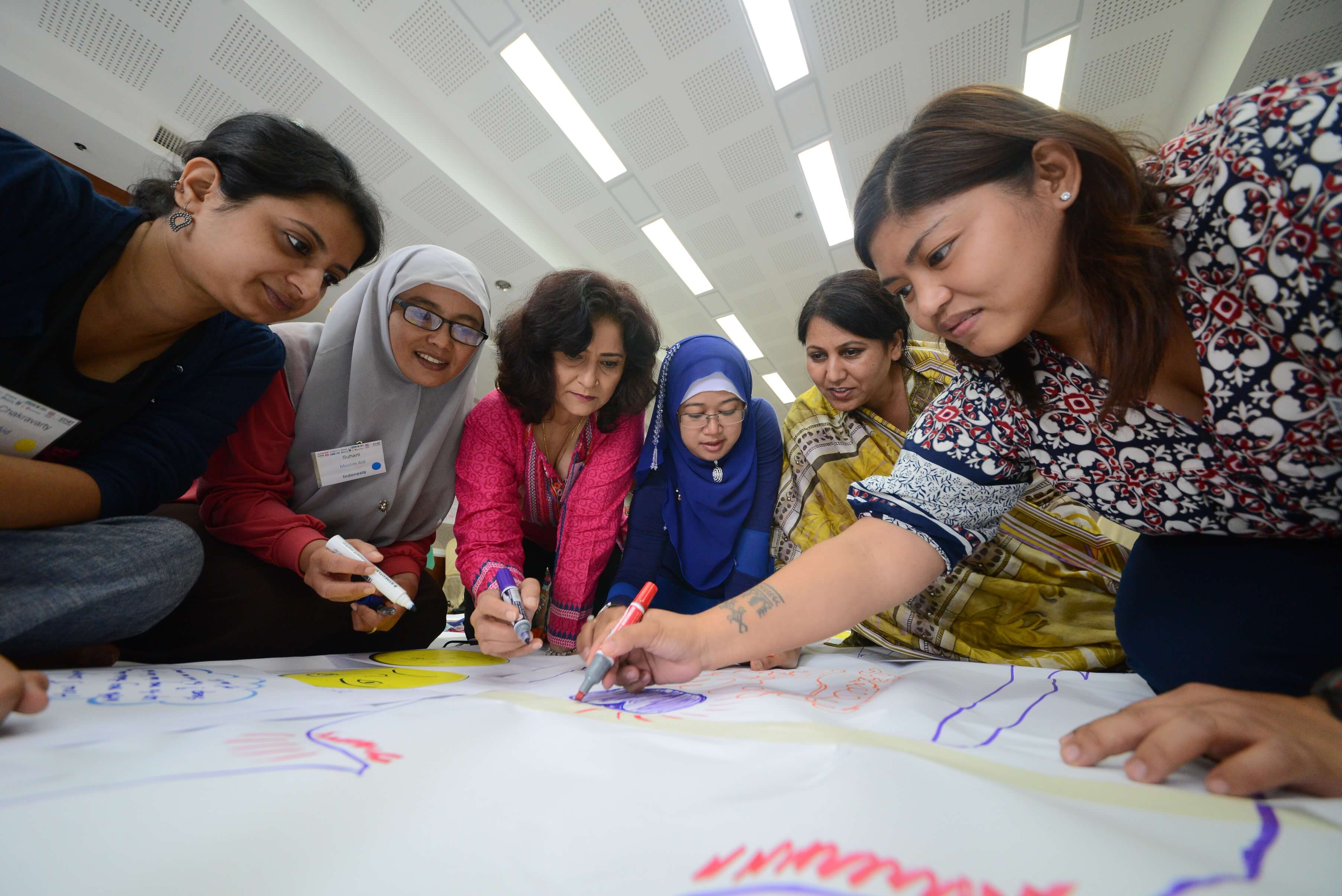This week the first collaborative regional roster for humanitarian response was launched in Bangkok.
Rosters are currently held by one organisation, and this new shared roster will enable humanitarian agencies to draw on a pool of trained, skilled and available humanitarian staff that can be deployed across Asia when a crisis hits. It will also strengthen the capacity of humanitarian staff in the region, who can get experience outside of their country and their regular organisation.
The roster is a pilot of the Transforming Surge Capacity project which is testing and building evidence of new approaches to surge which are more collaborative and localised, with the ultimate aim of improving surge capacity across the sector.
The roster includes 30 humanitarian staff members who have been nominated from across seven agencies and this week members from the’s Asia regional platform came together in Bangkok to attend surge training.
During this week, participants will be attending an innovative surge training which has been developed with input from the project’s 11 consortium members, to meet some of the very specific challenges which surge staff face in emergencies.
The Transforming Surge Capacity project was funded with £2.48 million from DFID’s Disaster and Emergencies Preparedness Programme (DEPP). The project is comprised of a regional hub based in Bangkok, country platforms in Pakistan and the Philippines, and an International platform made up agencies at headquarter levels.
It is expected that through deployments from the shared roster, response staff can learn and apply skills from across agencies, thus benefitting their own organisation and the organisation they are deployed with, and contributing to more collaboration on surge across the sector.
This roster allows participating agencies to draw on a shared pool of existing mid- and senior-level staff members from across the region. These staff members can be seconded to support surge response in L2 disasters on one-month deployments. Following an initial round of nominations, the shared roster has 30 members from 9 countries (Bangladesh, Cambodia, India, Indonesia, Myanmar, Nepal, Pakistan, Philippines, and Sri Lanka). The initial pilot phase focuses on three skills areas (logistics and supply chain; cash and voucher programming; gender, protection and inclusion), and more sectors are expected to be added later in 2016.
Ram Kishan, Regional Emergency Manager, Christian Aid said:
“In my opinion transforming surge capacity means finding the resources closer to the need. For long, humanitarian surge was dependent on expertise coming from few hubs including many in Europe and America but over the year similar capacities have been developed in various developing countries. There is a need to recognise these resources to build local capacities and prepare them for humanitarian deployment in their own countries or region. I think there is a lot at stake in this project, where we are trying to challenge the established system. Ensuring that this project succeeds is important for the sector.”
Clare Condillac, Regional HR & OD Partner, Plan International said:
“The success of the regional platform of the project hinges on the shared roster, and platform members are investing a lot of time and energy into this. How will the people deployed under the shared roster improve the overall quality of the response for the affected people, and how will they then bring their learning back into their own organisations? It is about how we support people to leverage opportunities for collaboration during their deployment and to transfer that into their organisation, so that organisations can see and appreciate the value of sharing human resources in surge.”
The training
A baseline survey conducted through the project found that one of the greatest sources of stress for surge staff was insufficient line management, team relationships and behaviour of other staff members. Whilst there are medium term capacity development opportunities in these areas, there are very limited short courses accessible for surge staff. The modules in this surge training provide an introduction to the behavioural skills required to conduct a successful surge deployment and are specifically focussed on some of the distinct challenges found during the ‘surge’ phase of an emergency.
The five day face to face curriculum is comprised of 8 modules plus an integrated introduction to mindfulness course: Humanitarian sector (online pre-course e-learning); what to expect in your surge deployment; culture and diversity; Women’s Rights in Emergencies; accountability and participation; people management; working with others; stress and wellbeing
From inception through to delivery, this five day face to face training has been a collaborative affair. The curriculum design was led by CAFOD with support of a multi-agency, multi country training working group. A number of agencies came together to deliver the two pilot trainings which took place in Manila and Bangkok and there are external collaborations with the Centre for Creative Leadership.
Zubedy Koteng, Save the Children Indonesia: “The training really cleared my mind about the diversity of the organisations involved in this roster. Working in silo is very dangerous and creates confusion in the communities. This training is a great starting point to improve our mutual understanding.”
Jemelle Milanes, CARE Philippines: “Coming into the training and hearing from colleagues about their experience in other countries helped me learn a lot; it feels like getting on their toes in a surge response. We know now what to expect when we get deployed.”
Barsha Chakraborty, ActionAid India: “This training is focused on the soft skills, which we often miss out on but which are really important. I’ve never been to a training like that.”
Saba Mahmood Training Working Group member, Islamic Relief: “The training modules cover every aspect of a deployment; what to do and how to prepare before you go, during deployment and post deployment. Once members have completed the 8 modules, they will be better prepared to undertake an effective deployment and make a positive contribution to their team

